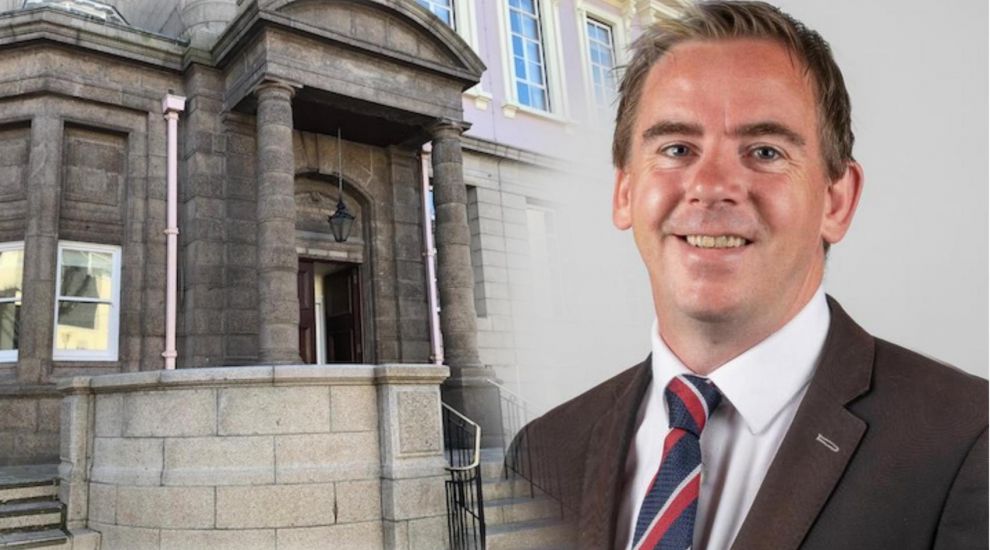

A politician, who faced losing his job over an elections expenses charge which was later dropped, is urgently calling for a change in the law to prevent others from “suffering” through a legal process he described as “seriously flawed."
“I’ve barely eaten and slept over the whole of the Christmas period… To be dragged into the Magistrate’s Court over all of this was just an awful experience. This was never in the public interest.”
The comments come from Deputy Scott Wickenden, who spoke to Express after what he describes as an “ordeal”.
This time last week, he learned that the impending trial against him – a charge of breaking the Public Elections Law – would no longer be going ahead after it emerged that over 40 other people were suspected of committing the same offence.
But the St. Helier Deputy says it’s not himself he feels sorry for, given what he describes as “mishandling” of the prosecution process that led to the dozens of other suspected lawbreakers emerging, but defendants who may have also faced difficulties with the island’s legal system.
In early January, Deputy Wickenden, alongside Deputy Hugh Raymond and unsuccessful St. Helier candidate Bernard Manning, was charged with “failing to deliver a declaration” relating to elections expenses – a charge he said drums up images of a “scandal” relating to “fiddling."

Pictured: Deputy Hugh Raymond, and former election candidate Bernard Manning, who were also facing trial for the same offence as Deputy Wickenden.
In reality, the Deputy had failed to hand in a list of all his spending on promotional election material within 15 days of election day, which he explains was due to illness.
“I got struck down ill. It was before the timeline to hand in my elections expenses form. I went to the doctors, I had shingles all down my back, I’d also pulled my back so I could barely walk so I went to the doctors. You’re advised don’t be near anyone because it’s so highly contagious… It took a month to recover,” Deputy Wickenden recalled.
While this meant he missed the limit, he was not the only one. The Judicial Greffe had granted an extension period – something it later emerged was not legally possible.
In the end, it emerged that as many as 45 people may have broken the law for this reason – 18 of whom were sitting politicians.
Had they all been found guilty, all 18 would have been disqualified from their seats and face a by-election at an “enormous” cost, according to the Deputy.
“I don’t think it was ever the intention to put that in the law. I think it was missed out during the Scrutiny. The intention was if somebody fiddled their expenses, spent more than they should, then there should be repercussions. It was never the intention that if you hand in a piece of paper that’s not scrutinised… that you get a criminal conviction so you’re not allowed to travel around the world.
“You’d have a criminal conviction for not handing in a piece of paper on time. A piece of paper that nobody looks at… It will only be audited if the Judicial Greffe wants to audit it,” he said, adding that no invoices or receipts are required to be attached to the documentation.
The Deputy said that, when he was first interviewed by Police about his late form submission in September 2018, he had no idea that he could lose his job over the offence – and neither had the politicians who voted on the law in 2014, it later transpired.
“Everyone I’ve spoken to that voted for it has apologised to me personally saying ‘I didn’t see it, and if I did see it, I would have removed it.’ It was just before an election and we all know that bringing in legislation before an election starts is bad. There just wasn’t the proper legislative scrutiny, and there should be.”
He later added: “Nobody comes out of this looking shiny. Everyone has been bad in this process. The law draftsman, the Assembly that passed it, the Judicial Greffe that was supposed to scrutinise, myself that maybe could have done more. No one looks good in this.”
He is now urgently calling for the law to be reviewed in order that others don’t go through the same, and suggests that the 15-day limit be extended, given that the post-election period is an “extraordinarily busy” time for States Members old and new.
At the same time, the Deputy says the process also has raised “serious questions” over how prosecutions are handled on the island.
In the early stages of the process, the Deputy said he was “in the dark” over the case, and that he was given little time to prepare his defence.
Being charged prior to Christmas, he was only left with 18 days – eight of which were working days – to decide how to proceed.
On top of that, he expressed concerns about the difficulties his lawyer faced in getting evidence. When they asked for records of other election candidates’ spending, they were denied the information – apparently, he says, because prosecutions are handled on a “case-by-case basis” meaning that others’ offences were not “relevant”.
He highlighted the irony that the case against him was dropped given the later revelation that many others may have committed the same offence of which he was accused.
The Deputy added that the prosecution also appeared to have “missed” a part of the law allowing for those who had submitted their forms late to do so with a “reasonable excuse”.
“I hope that I’m the only one that’s been through this… Is this the norm for the judicial system? And if it is, the people of Jersey deserve better.”
Comments
Comments on this story express the views of the commentator only, not Bailiwick Publishing. We are unable to guarantee the accuracy of any of those comments.